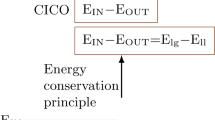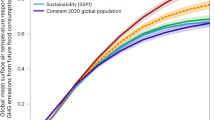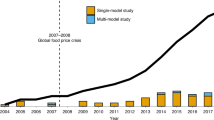Abstract
The current climate change has been most likely caused by the increased greenhouse gas emissions. We have looked at the major greenhouse gas, carbon dioxide (CO2), and estimated the reduction in the CO2 emissions that would occur with the theoretical global weight loss. The calculations were based on our previous weight loss study, investigating the effects of a low-carbohydrate diet on body weight, body composition and resting metabolic rate of obese volunteers with type 2 diabetes. At 6 months, we observed decreases in weight, fat mass, fat free mass and CO2 production. We estimated that a 10 kg weight loss of all obese and overweight people would result in a decrease of 49.560 Mt of CO2 per year, which would equal to 0.2% of the CO2 emitted globally in 2007. This reduction could help meet the CO2 emission reduction targets and unquestionably would be of a great benefit to the global health.
This is a preview of subscription content, access via your institution
Access options
Subscribe to this journal
Receive 12 print issues and online access
$259.00 per year
only $21.58 per issue
Buy this article
- Purchase on Springer Link
- Instant access to full article PDF
Prices may be subject to local taxes which are calculated during checkout
Similar content being viewed by others
References
HM Government. Climate change. HM Government, 2009, http://www.direct.gov.uk/en/Environmentandgreenerliving/Thewiderenvironment/Climatechange/index.htm.
The World Bank. World Development Indicators. CO2 emissions (kt) (Online). The World Bank: Washington, DC, 2011. Available at http://data.worldbank.org (Last updated 4 October 2010).
Met Office. Climate change — your essential guide. Report No.: 09/0050. Met Office: Exeter, Devon, UK, 2009.
Faergeman O . Climate change and preventive medicine. Eur J Cardiovasc Prev Rehabil 2007; 14: 726–729.
Shea KM . Climate change: public health crisis or opportunity. J Public Health Manag Pract 2008; 14: 415–417.
Delpeuch F, Maire B, Monnier E, Holdsworth M . Globesity. A Planet Out of Control? 2009. Earthscan: London.
Mawle A . Climate change, human health, and unsustainable development. J Public Health Policy 2010; 31: 272–277.
Egger G, Swinburn B . Planet Obesity. We Are Eating Ourselves and The Planet to Death 2010. Allen & Unwin: Crows Nest.
Hession M, Rolland C, Kulkarni U, Wise A, Broom J . Systematic review of randomized controlled trials of low-carbohydrate vs low-fat/low-calorie diets in the management of obesity and its comorbidities. Obes Rev 2009; 10: 36–50.
World Health Organization. Obesity and Overweight. Fact sheet No. 311. WHO: Geneva, 2011. Available at http://www.who.int/mediacentre/factsheets/fs311/en/index.html.
Edwards P, Roberts I . Population adiposity and climate change. Int J Epidemiol 2009; 38: 1137–1140.
Turner H, Wass J . Oxford Handbook of Endocrinology and Diabetes. Oxford University Press: Oxford, 2002.
HM Government. The UK Low Carbon Transition Plan. National Strategy for Climate and Energy. HM Government, The Stationery Office: Norwich, 2009.
Office for National Statistics. News Release: UK Population Approaches 62 Million. Crown Copyright: Newport, 2010.
The Scottish Government. Scottish Health Survey 2008. The Scottish Government: Edinburgh, 2009.
The NHS Information Centre. Health Survey for England 2008 Volume 1: Physical Activity and Fitness. The NHS Information Centre: Leeds, 2009.
Bitz C, Toubro S, Larsen TM, Harder H, Rennie KL, Jebb SA et al. Increased 24-h energy expenditure in type 2 diabetes. Diab Care 2004; 27: 2416–2421.
Wilkinson RG, Pickett KE, De Vogli R . Equality, sustainability, and quality of life. BMJ 2010; 341: c5816.
Acknowledgements
We thank A Stewart for reading of the manuscript and critical comments. The study of low-carbohydrate diet was supported by the Go Lower Company.
Author information
Authors and Affiliations
Corresponding author
Ethics declarations
Competing interests
The authors declare no conflict of interest.
Rights and permissions
About this article
Cite this article
Gryka, A., Broom, J. & Rolland, C. Global warming: is weight loss a solution?. Int J Obes 36, 474–476 (2012). https://doi.org/10.1038/ijo.2011.151
Received:
Revised:
Accepted:
Published:
Issue Date:
DOI: https://doi.org/10.1038/ijo.2011.151
Keywords
This article is cited by
-
How Can We Act to Mitigate the Global Syndemic of Obesity, Undernutrition, and Climate Change?
Current Obesity Reports (2022)
-
Obesity Kuznets curve hypothesis and global warming: a robust estimation under cross-section dependence
Environmental Science and Pollution Research (2021)
-
Telemedicine and urban diabetes during COVID-19 pandemic in Milano, Italy during lock-down: epidemiological and sociodemographic picture
Acta Diabetologica (2021)
-
Does diet intervention in line with nutrition recommendations affect dietary carbon footprint? Results from a weight loss trial among lactating women
European Journal of Clinical Nutrition (2017)



